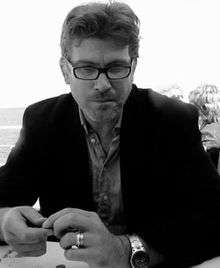Laird Hunt
Laird Hunt (born April 3, 1968) is an American writer, translator and academic.
Laird Hunt | |
|---|---|
 Laird Hunt | |
| Born | April 3, 1968 Singapore |
| Occupation | Novelist |
| Nationality | United States |
Life
Hunt grew up in Singapore, San Francisco, The Hague, and London before moving to his grandmother's farm in rural Indiana, where he attended Clinton Central High School.[1] He earned a B.A. from Indiana University and a Master of Fine Arts in Creative Writing from the Jack Kerouac School of Disembodied Poetics at Naropa University. He also studied French literature at the Sorbonne. Hunt worked in the press office at the United Nations while writing his first novel. He was a professor in the Creative Writing program at University of Denver. Hunt lives with his wife, the poet Eleni Sikelianos, in Providence, Rhode Island, and works as a professor of Literary Arts at Brown University.[2][3]
Writing career
Hunt is the author of seven novels and a collection of short work. His works intersect several genres, including experimental literature, exploratory fiction, literary noir, speculative fiction and difficult fiction[4][5] and include elements ranging from the bizarre, the tragic, and the comic. His influences include Georges Perec, W. G. Sebald, Samuel Beckett, Franz Kafka and the French Modernists.[6][7] Hunt has also translated several novels from the French including Oliver Rohe's Vacant Lot (2010), Stuart Merrill's Paul Verlaine (2010). He has contributed to many literary publications, including McSweeney's, Ploughshares, Bomb, Bookforum, The Believer, Fence, and Conjunctions and is currently editor of the Denver Quarterly.
Awards and honors
- 2013 Anisfield-Wolf Book Awards for fiction for Kind One[8]
- 2013 PEN/Faulkner Award for Fiction finalist for Kind One[9]
- 2015 Grand Prix de Littérature Américaine for Neverhome[10]
Film adaptations
In 2014 it was announced that Irish director Lenny Abrahamson would film an adaptation of Hunt's Civil War novel Neverhome.[11]
Works
- Dear Home. Small Press Distribution. 1999. ISBN 9781893032200
- The Paris Stories. Smokeproof Press; Marick Press. 2010 [2000].ISBN 9780965887786
- The Impossibly. Minneapolis: Coffee House Press. 2012 [2001]. ISBN 9781566891172
- Indiana, Indiana. Minneapolis: Coffee House Press. 2003. ISBN 9781566891448
- The Exquisite. Minneapolis: Coffee House Press. 2006.ISBN 9781566891875
- Ray of the Star. Minneapolis: Coffee House Press. 2009. ISBN 9781566892322
- Kind One. Minneapolis: Coffee House Press. 2012. ISBN 9781566893114
- Neverhome. New York: Little Brown and Company. 2014.ISBN 9780316370134
- Contributed to The &NOW Awards 2: The Best Innovative Writing. &NOW Books, Lake Forest College Press. 2013. ISBN 9780982315644[12]
- The Evening Road. New York: Little Brown and Company. 2017.[13] ISBN 9780316391283
- In the House in the Dark of the Woods. Little, Brown and Company. 2018.[14] ISBN 9780316411059
References
- Ruland, Jim (January 2010). "An Interview with Laird Hunt (part 1)". Hobart Another Literary Journal. Archived from the original on April 14, 2012. Retrieved January 21, 2012.
- "Laird B Hunt". Researchers@Brown. Brown University. Retrieved November 14, 2019.
- Wilmot, Rosie (October 2009). "Laird Hunt, Beyond The Pen". DU Clarion. University of Denver. Archived from the original on 2012-09-06. Retrieved January 21, 2012.
- Kamine, Mark (2005). "In Defense of Difficulty". The Believer. Retrieved January 21, 2012.
- Ruland, Jim (February 2010). "An Interview with Laird Hunt (part 2)". Hobart Another Literary Journal. Retrieved January 21, 2012.
- Tiffany, Matthew (September 2009). "Ray of The Star by Laird Hunt". The Quarterly Conversation. Retrieved January 21, 2012.
- Kamine, Mark (November 2005). "In Defense of Difficulty". The Believer. Retrieved January 21, 2012.
- Conners, Joanna (2013-04-24). "Writer Wole Soyinka intends to be in Cleveland for Anisfield-Wolf award later this year". The Plain Dealer. Retrieved 2013-07-06.
- Kellogg, Carolyn (2013-03-06). "2013 PEN/Faulkner Award finalists announced". The Los Angeles Times. Retrieved 2013-03-06.
- Anne-Laure Walter (November 8, 2017). "Laird Hunt, premier lauréat du Grand prix de littérature américaine". Livres Hebdo (in French). Retrieved November 14, 2017.
- Niall Murphy (2014-09-24). "Irish Film: Lenny Abrahamson to adapt Laird Hunt's Neverhome". Scannain. Retrieved 2014-09-24.
- "The &Now Awards 2: The Best Innovative Writing: Davis Schneiderman: 9780982315644: Amazon.com: Books". Amazon.com. 2013-05-25. Retrieved 2013-12-31.
- Burnside, John (5 May 2017). "The Evening Road by Laird Hunt (review) – The Banality of Evil". The Guardian. Retrieved 14 May 2017.
- Ivey, Eowyn (25 October 2018). "In the House in the Dark of the Woods by Laird Hunt (review) – A Dark, Dark Take on Our Most Precious Fairy Tales". The New York Times Book Review. Retrieved 29 October 2019 – via The New York Times.